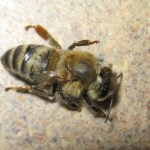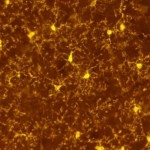Research model
Why does infection with bacteria or viruses make you feel sick? Prof. Guy Shakhar and Dr. Keren Shakhar have proposed that your symptoms are not just a byproduct of your body’s attempt to get rid of the infection. It is your genes’ way of ensuring they are passed down. The long and short of their argument is that the malaise, loss of appetite and lethargy are all ways of isolating you from your social group – so that your kin, who carry many of your genes, are not infected as well.
That means we share an evolutionary adaptation with such organisms as bees that go off to die far from the hive…
More science-themed haikus. I seem to keep writing them because we tend to put out three “mini press releases” at a time (a relic of the days when they were printed on two sides of a fold-up page and mailed). So I could pick just one to blog about, or I could try to fit all three into one post (which tends to get muddled when it is on subjects as varied as physics, neurobiology and genetics). Or else I can leave these little breadcrumbs inviting you to follow them back to our website, where the fuller explanation awaits (or, from there, you can follow the links in the releases to get to the…
New online articles this week highlight two forays into the world of synthetic biology. Each, in its own way, gives a different perspective on how sophisticated the field has become in the past few years, since smiley-face DNA was first introduced.
Prof. Benjamin Geiger of the Weizmann Institute and Prof. Joachim Spatz of the Max Planck Institute for Intelligent Systems, Germany are leading an unusual collaboration. One is a biologist, the other a materials scientist. Together, they are working on models that incorporate the whole gamut from completely man-made materials to 100% biological…


